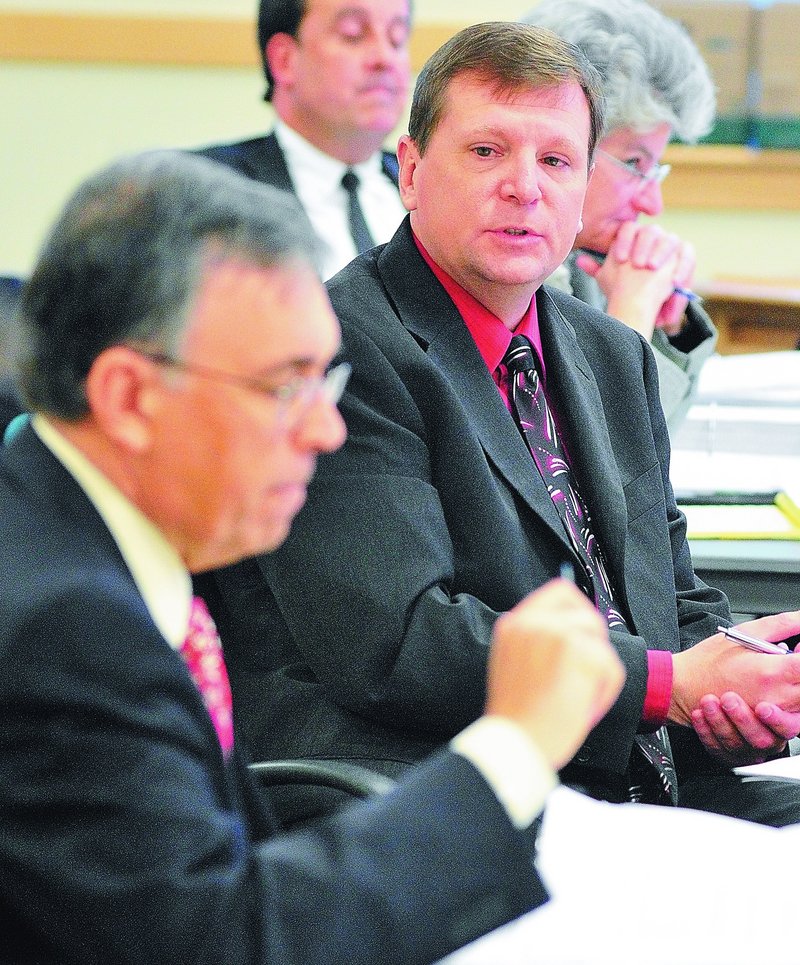AUGUSTA — The hearing officer in a dispute over a $35 million state lottery contract refused to hear testimony Tuesday from a former state official.
Assistant Attorney General Sarah Forster, who presided over the final day of the two-day hearing, ruled that Dick Thompson, the state’s former chief information officer, could not testify on behalf of Scientific Games.
Scientific Games of New York, which has its center of Maine data operations in Gardiner, is seeking to restore its contract with the state Bureau of Alcoholic Beverages and Lottery Operations.
The six-year, $35 million contact to provide instant lottery tickets and online lottery services was awarded in September to Intralot Inc., a company based in Athens, Greece.
Forster based her decision on the “appropriateness” of Thompson as an expert witness, saying he was not involved in the bidding process.
After a discussion with the three-person panel that is hearing the appeal by Scientific Games, Forster agreed to allow the company to submit written closing arguments.
“There’s a great deal at stake,” said Scientific Games’ attorney, Charles Dingman. “It’s a very expensive and complicated contract.”
The panel members are Michael Wenzel of the state Division of Purchases, Tony VanDenBossche of the State Planning Office and Chad Lewis of the state Department of Health and Human Services.
The panel can invalidate the contract award if Scientific Games can prove that anything illegal or irregular occurred in the bidding process, or that the award was arbitrary.
Michelle Robert, an assistant attorney general who is representing the Bureau of Alcoholic Beverages and Lottery Operations, and Jeffrey Lipps, Intralot’s attorney, objected to the addition of written arguments.
Lipps wanted lawyers to have the final say at the end of Tuesday’s meeting.
Forster told the parties that written arguments can be no longer than 20 pages and must be submitted by 5 p.m. Dec. 3.
“At that point, the committee will have 15 days to make a decision,” Forster said.
On Tuesday, Dingman continued questioning Michael Boardman, marketing manager for the lottery, alleging that the bureau’s scoring of the proposals was irregular and that the evaluation of the proposals was not transparent.
He also asked Boardman why the state didn’t do an independent investigation of Intralot, as other states had
On Monday, Dingman tried to introduce material into the record alleging that Intralot had legal and management problems in other countries where it did business or submitted bids.
Lipps objected to the question, and Boardman said, “I don’t know what other states have done.”
In Robert’s questioning of Boardman, he said the evaluation committee went through the proposals section by section and did site visits. When all questions from committee members were answered, he said, they went back and did a second, complete review of the three proposals.
Mark Robinson, a Biddeford-based spokesman for Intralot, said that – if the contract remains – the company does not plan to move the operation’s approximately 20 jobs to an Intralot data operations center in Vermont.
“Instead, Intralot intends to have 20 jobs in Maine – just two less than what Scientific Games does now,” Robinson said.
He didn’t specify where in Maine those jobs would be.
Send questions/comments to the editors.



Success. Please wait for the page to reload. If the page does not reload within 5 seconds, please refresh the page.
Enter your email and password to access comments.
Hi, to comment on stories you must . This profile is in addition to your subscription and website login.
Already have a commenting profile? .
Invalid username/password.
Please check your email to confirm and complete your registration.
Only subscribers are eligible to post comments. Please subscribe or login first for digital access. Here’s why.
Use the form below to reset your password. When you've submitted your account email, we will send an email with a reset code.